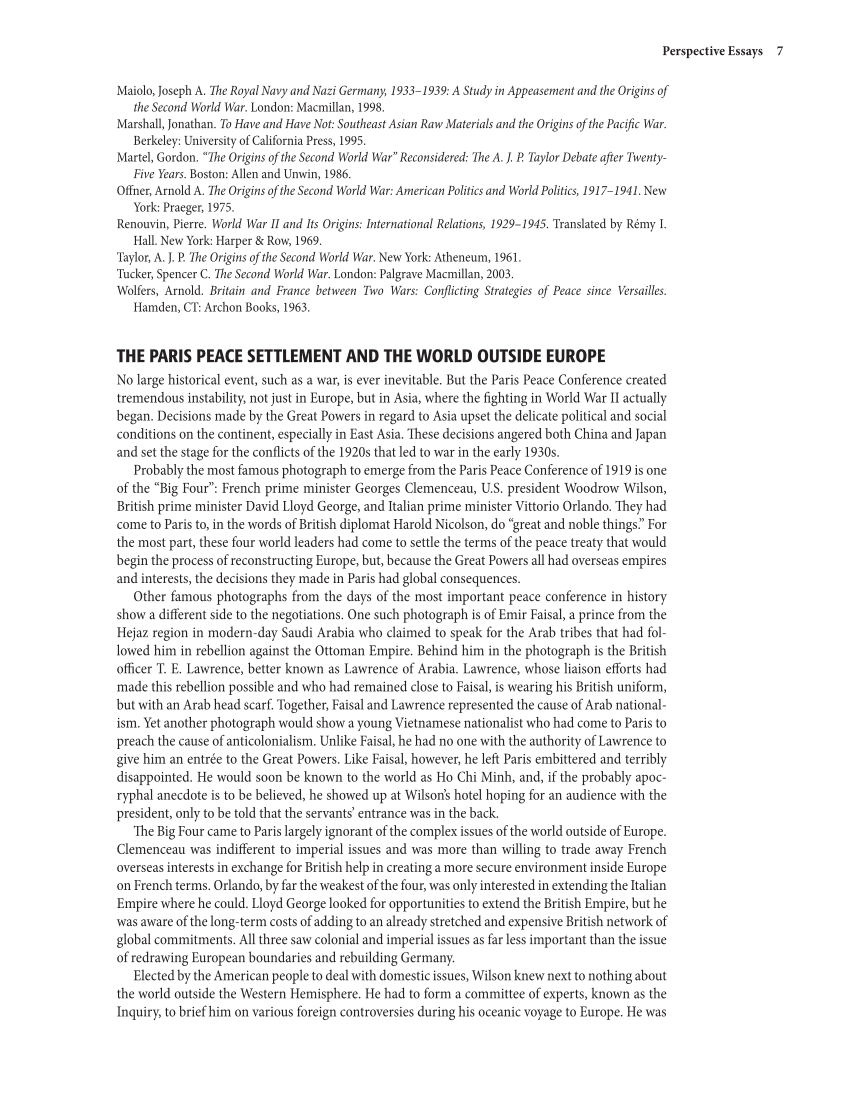Perspective Essays 7 Maiolo, Joseph A. The Royal Navy and Nazi Germany, 1933–1939: A Study in Appeasement and the Origins of the Second World War. London: Macmillan, 1998. Marshall, Jonathan. To Have and Have Not: Southeast Asian Raw Materials and the Origins of the Pacific War. Berkeley: University of California Press, 1995. Martel, Gordon. “The Origins of the Second World War” Reconsidered: The A. J. P. Taylor Debate after Twenty- Five Years. Boston: Allen and Unwin, 1986. Offner, Arnold A. The Origins of the Second World War: American Politics and World Politics, 1917–1941. New York: Praeger, 1975. Renouvin, Pierre. World War II and Its Origins: International Relations, 1929–1945. Translated by Rémy I. Hall. New York: Harper & Row, 1969. Taylor, A. J. P. The Origins of the Second World War. New York: Atheneum, 1961. Tucker, Spencer C. The Second World War. London: Palgrave Macmillan, 2003. Wolfers, Arnold. Britain and France between Two Wars: Conflicting Strategies of Peace since Versailles. Hamden, CT: Archon Books, 1963. THE PARIS PEACE SETTLEMENT AND THE WORLD OUTSIDE EUROPE No large historical event, such as a war, is ever inevitable. But the Paris Peace Conference created tremendous instability, not just in Europe, but in Asia, where the fighting in World War II actually began. Decisions made by the Great Powers in regard to Asia upset the delicate political and social conditions on the continent, especially in East Asia. These decisions angered both China and Japan and set the stage for the conflicts of the 1920s that led to war in the early 1930s. Probably the most famous photograph to emerge from the Paris Peace Conference of 1919 is one of the “Big Four”: French prime minister Georges Clemenceau, U.S. president Woodrow Wilson, British prime minister David Lloyd George, and Italian prime minister Vittorio Orlando. They had come to Paris to, in the words of British diplomat Harold Nicolson, do “great and noble things.” For the most part, these four world leaders had come to settle the terms of the peace treaty that would begin the process of reconstructing Europe, but, because the Great Powers all had overseas empires and interests, the decisions they made in Paris had global consequences. Other famous photographs from the days of the most important peace conference in history show a different side to the negotiations. One such photograph is of Emir Faisal, a prince from the Hejaz region in modern-day Saudi Arabia who claimed to speak for the Arab tribes that had fol- lowed him in rebellion against the Ottoman Empire. Behind him in the photograph is the British officer T. E. Lawrence, better known as Lawrence of Arabia. Lawrence, whose liaison efforts had made this rebellion possible and who had remained close to Faisal, is wearing his British uniform, but with an Arab head scarf. Together, Faisal and Lawrence represented the cause of Arab national- ism. Yet another photograph would show a young Vietnamese nationalist who had come to Paris to preach the cause of anticolonialism. Unlike Faisal, he had no one with the authority of Lawrence to give him an entrée to the Great Powers. Like Faisal, however, he left Paris embittered and terribly disappointed. He would soon be known to the world as Ho Chi Minh, and, if the probably apoc- ryphal anecdote is to be believed, he showed up at Wilson’s hotel hoping for an audience with the president, only to be told that the servants’ entrance was in the back. The Big Four came to Paris largely ignorant of the complex issues of the world outside of Europe. Clemenceau was indifferent to imperial issues and was more than willing to trade away French overseas interests in exchange for British help in creating a more secure environment inside Europe on French terms. Orlando, by far the weakest of the four, was only interested in extending the Italian Empire where he could. Lloyd George looked for opportunities to extend the British Empire, but he was aware of the long-term costs of adding to an already stretched and expensive British network of global commitments. All three saw colonial and imperial issues as far less important than the issue of redrawing European boundaries and rebuilding Germany. Elected by the American people to deal with domestic issues, Wilson knew next to nothing about the world outside the Western Hemisphere. He had to form a committee of experts, known as the Inquiry, to brief him on various foreign controversies during his oceanic voyage to Europe. He was
Document Details My Account Print multiple pages
Print
You have printed 0 times in the last 24 hours.
Your print count will reset on at .
You may print 0 more time(s) before then.
You may print a maximum of 0 pages at a time.





















































































































































































































































































































